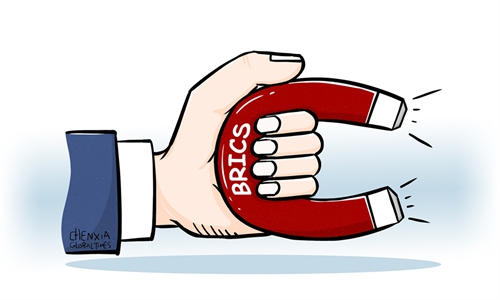
Illustration: Chen Xia/GT
Within days of each other, two very different meetings of world significance were held.These meetings sharply frame the choices. Is the way forward cooperation, sustainable development and trade? Or is the only option confrontation and military escalation?
What kind of future do these two meetings represent? It deserves to be analyzed and compared.
At the Camp David military base outside of Washington DC on August 18, US President Joe Biden framed an aggressive military alliance, with South Korean President Yoon Suk-yeol and Japanese Prime Minister Fumio Kishida dutifully attending. This trilateral security agreement of the US, South Korea and Japan is directly aimed at China and North Korea. The military bloc is understood as?concretizing a "new cold war" against China.
Whether the recent agreement holds together or not, the Camp David meeting is a further step in Washington's strategy of inserting tensions, instability and continuing provocations in the region in an attempt to block China's development and its growing regional trade with its neighbors. Washington is attempting to mask the economic decline of the US by asserting its military dominance in the Pacific.
In sharp contrast, the XV BRICS Summit, held under the theme: "BRICS and Africa: Partnership for Mutually Accelerated Growth, Sustainable Development and Inclusive Multilateralism," opened four days later, from August 22 to24, in Johannesburg, South Africa. This summit focused on building an open world economy that supports trade and promotes cooperation. Concrete plans for African development was a recurring theme.
BRICS stands for Brazil, Russia, India, China and South Africa. These five countries, with a total population of 3 billion, or 40 percent of the world's people, have widely different political and economic systems. However, they are all developing countries and were once colonies or neo-colonies. At the conclusion of the gathering, South African President Cyril Ramaphosa announced that six more countries were admitted to?BRICS: Argentina, Egypt, Ethiopia, Iran, Saudi Arabia and the United Arab Emirates.
At the BRICS meeting, Chinese President Xi Jinping expressed China's willingness to deepen solidarity and cooperation with other emerging markets and developing countries to push for a more just and equitable world order.
President Xi's speech declared: "Emerging countries are becoming more and more relevant in the international arena. This summit will very much contribute to the shaping of a new global economic and political order. It will help change the current situation when it comes to international relations."
The overwhelming US military presence in Japan and South Korea since 1945 exerts extreme political pressure. This constant pressure is felt in every country occupied by US troops and military bases. There are still 53,700 US troops in Japan on 120 military bases - more bases than in any other country. Some 26,400 US troops are stationed on 73 bases in South Korea, including Camp Humphreys, the largest overseas US military base.
This new Camp David security agreement is a result of Washington's revival and upgrading of the Quad, which holds joint military exercises that openly target China.
Another military alliance - the AUKUS trilateral security pact among the US, Australia and the UK - has provided cover for US naval and air training missions in the region. Under that pact, the US and the UK will assist Australia in acquiring nuclear-powered submarines.?
China is a major trading partner of more than 120 countries and regions, including Japan, South Korea, the Philippines and Australia.?US corporate interests are consumed with the task of how to reverse this economic reality and contain China, in the Asia-Pacific region and globally.
The biggest and most immediate impact of this military offensive will be felt on the global environment, increasing insecurity. Rather than focusing on resources, and the vast scientific and technical knowhow on the escalating climate crisis, US corporations focus on quick profits from war. US politicians feel the pressure to vote for even more increases in military allocations.
According to the National Priorities Project, the full military budget of the US is approximately $900 billion - more than the next 10 countries combined and 40 percent of the world total.
While the security pact devised at Camp David won't reverse the declining economic power of the US, it will intensify global insecurity.
The BRICS group embraces more equitable trade and development, which is a challenge to US sanctions imposed on nearly 40 countries. The growing ability of countries to use their own currencies in direct trade is a threat to the power of the almighty dollar. The BRICS economies have overtaken the G7's global GDP.
The atmosphere of solidarity and cooperation exemplified by the BRICS cooperation mechanism is helping to propel development across the African continent. Over 40 countries have expressed a desire to become a member, including those in the Middle East, Latin America and Africa.
BRICS represents the growing aspiration for a more balanced global order. While this threatens imperialist domination, it also injects positive energy and new confidence into the world.
The author is a political writer and activist for 50 years in the US. She is a contributing editor of Workers World Newspaper and helps coordinate the International Action Center and the United National Antiwar Coalition. opinion@globaltimes.com.cn

